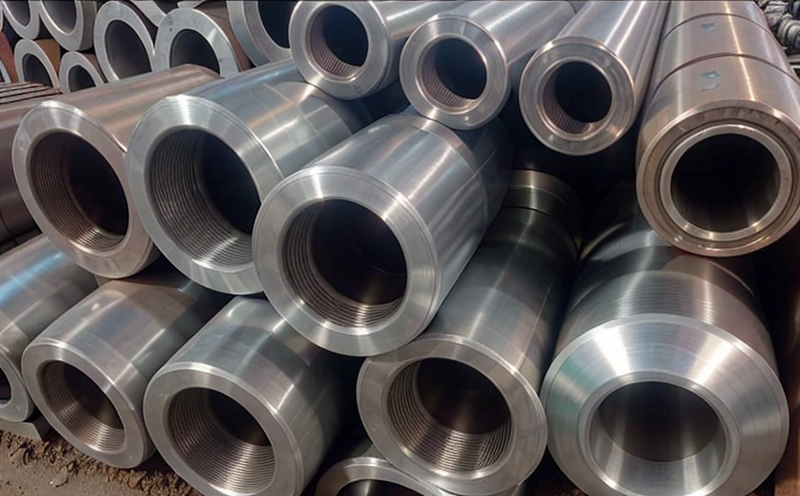Ferrous Metals and Alloys
The term ferrous metals and alloys refers to metallic substances that contain iron as a principal component. These materials are widely used in the HVAC sector due to their excellent mechanical properties, corrosion resistance, and ability to withstand high temperatures. Ferrous alloys such as steel and cast iron are extensively employed for manufacturing critical components like condensers, evaporators, heat exchangers, and pressure vessels.
The testing of ferrous metals and alloys in the HVAC industry is crucial for ensuring product quality, safety, and compliance with international standards. The primary goal is to assess mechanical properties, corrosion resistance, weldability, and other critical parameters that impact performance under operational conditions. Compliance with standards such as ISO 9001, ASTM A248, and EN 10025 ensures that the materials used meet stringent quality requirements.
Testing typically involves a range of methodologies including tensile testing to measure yield strength and ultimate tensile strength, hardness testing using Rockwell or Brinell scales, impact testing to evaluate toughness, and chemical analysis for composition verification. Additionally, non-destructive tests like magnetic particle inspection (MPI) are used to detect surface and near-surface flaws.
The importance of these tests cannot be overstated in the HVAC sector where equipment reliability is paramount. Ensuring that ferrous metals meet specified standards can prevent costly failures and improve overall system efficiency. For instance, a failed condenser or evaporator could lead to significant downtime and increased maintenance costs.
| Test Parameters | Description |
|---|---|
| Tensile Testing | Determines the maximum stress that can be withstood by a material before failure. |
| Hardness Testing | Metric for assessing the hardness of materials using various scales. |
| Impact Testing | Evaluates the toughness and brittleness of a metal under dynamic load conditions. |
| Chemical Analysis | Verifies the composition to ensure it meets specified alloying elements. |
| Magnetic Particle Inspection (MPI) | Non-destructive method for detecting surface and near-surface flaws in ferrous materials. |
The use of advanced testing techniques ensures that only the highest quality ferrous metals are used, enhancing the durability and longevity of HVAC equipment. This not only benefits manufacturers but also end-users by providing reliable performance over extended operational periods.
Why It Matters
The importance of testing ferrous metals and alloys in the HVAC sector cannot be overstated as it directly impacts product quality, safety, and compliance with industry standards. Ensuring that materials used meet stringent specifications is critical for preventing equipment failures and ensuring efficient system performance.
- Enhances durability and longevity of HVAC components
- Promotes compliance with international standards like ISO 9001 and ASTM A248
- Avoids costly repairs and replacements due to material failure
- Ensures consistent quality across manufacturing batches
Ferrous metals are chosen for their robustness, which is essential in environments where equipment is subjected to high pressures and temperatures. By adhering to rigorous testing protocols, manufacturers can ensure that the materials used are reliable and capable of withstanding harsh operating conditions.
Industry Applications
Ferrous metals and alloys play a crucial role in HVAC equipment manufacturing due to their unique properties. These materials are extensively used for various components including:
- Condensers
- Evaporators
- Heat Exchangers
- Pressure Vessels
- Valves and Fittings
The table below summarizes the key applications of ferrous metals in HVAC equipment:
| Component | Description |
|---|---|
| Condensers | Heat exchangers that cool and condense refrigerant vapor into a liquid. |
| Evaporators | Heat exchangers where the refrigerant is evaporated by absorbing heat from the surrounding air or water. |
| Heat Exchangers | Components that transfer heat between two fluids without mixing them. |
| Pressure Vessels | Contain gases or liquids under pressure for storage, transportation, and processing. |
| Valves and Fittings | Control the flow of refrigerant through HVAC systems. |
The choice of ferrous metals is driven by their ability to withstand high pressures and temperatures while maintaining structural integrity. This makes them ideal for use in critical components that are subjected to harsh operating conditions.
Use Cases and Application Examples
The testing of ferrous metals and alloys is essential across various applications within the HVAC sector. Here are some real-world examples:
- Condenser Testing: Ensuring that condensers can withstand high-pressure refrigerant flows without failure.
- Evaporator Testing: Evaluating evaporators for their ability to efficiently cool air or water by maintaining temperature stability under varying loads.
- Heat Exchanger Testing: Verifying the efficiency and durability of heat exchangers that transfer heat between refrigerant streams.
- Pressure Vessel Testing: Assessing pressure vessels for their ability to contain high-pressure refrigerants safely.
- Valve Testing: Ensuring that valves can withstand high operating pressures while maintaining precise control over refrigerant flow rates.
In addition to these applications, ferrous metals are also tested in various other HVAC components such as compressors and air handlers. The testing process ensures that each component meets strict quality standards, thereby enhancing the overall performance of HVAC systems.





